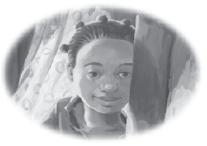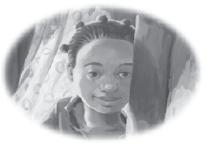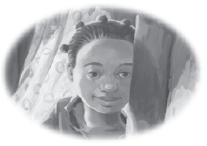The Paper House (8 page)

“It's a road!” said Pendo, pointing.
“You're right,” said Mr. Littlejohn. “It looks so hot and dusty with all those browns and yellows. And that patch of blue and green?” He pointed to where the wall met the crooked roof.
“That's my village,” Safiyah told him. “Far away in the country.”
He nodded. “I see.” He scanned the whole wall. “But your mural is not yet finished.”
“I have enough pictures for this wall. Maybe one other.” Safiyah looked at her friend before she turned back to her teacher. “But I don't have enough paste.”
“Paste?” Mr. Littlejohn turned slowly toward both girls as if he had forgotten they were there. “I'm sure I can find you more paste,” he said. “Then you can finish this wall. And what will you do on the next one?”
“I don't know yet,” said Safiyah. When she saw the hopeful look on her friend's face, she found it easy to say the right words. “Pendo can help me decide. It was her idea to start with.”

“Saffy?” Cucu came round the corner, leaning on her stick. “All this chatter woke me. Who is this?”
“David Littlejohn, missus.” He shook hands with Cucu. “Pendo's teacher. She told me all about your granddaughter's mural. You just be very proud of her.”
Cucu grinned. “My Safiyah is a good granddaughter.”
“And she has such talent.” The teacher nodded toward the mural on the back wall.
“Talent?” Cucu frowned. “Saffy does have persistence. The time she has taken⦔
“Her work here is⦔ Mr. Littlejohn groped for the word. “Splendid,” he finally said. “In fact, for a ten-year-old, I would say she is gifted.”
Cucu pinched Safiyah's cheek and laughed. “Gifted?” She studied the mural that swept like a scarf across the wall. “Oh, my.” She clapped her hand to her chest. “That looks like⦔ She turned to Safiyah. “Our journey to the city? The road that went on forever?”
“I tell you what.” Mr. Littlejohn's voice was brisk, as if he wanted to distract Cucu from sad memories. “The school can spare all the paste Safiyah needs. And with Pendo to help, I am sure her mural will be finished soon.”
Cucu gave Safiyah a look of surprise.
Later she would tell her grandmother how she and Pendo were friends again, thought Safiyah. So easily, with just a few words.
“But will you allow me one thing?” Mr. Littlejohn asked Cucu. “I would like to send a photographer to take pictures of the house.”
“Photos!” Pendo jumped up and down. “Can I be in them?”
“That will be up to the photographer,” he said. “And Safiyah.”
“Saffy? Please say I can,” begged Pendo.
“First you have to promise,” said Safiyah.
“Anything!”
“You have to put the pictures only where I tell you. It's my mural.”
“I promise.” Pendo linked arms with Safiyah.
“That's settled.” Mr. Littlejohn took Cucu's arm and let her rest her weight on him as he led her back indoors.
Safiyah watched them go. She scuffed the ground with her foot. “I'm sorry I was mean to you, Pendo.”
“And I'm sorry I wrecked your picture.” The girls stood together for a moment, studying the mural. Then they sat on Cucu's bench swinging their legs until Pendo's feet were just as dirty as Safiyah's.
“Do you know how to play mancala?” asked Safiyah.
“Of course I do.” Pendo's tiny braids bobbed as she nodded. “My father plays with the church deacon for hours and hours.” She rolled her eyes. “While they talk about God.”
“I thought only ladies played,” said Safiyah. “Cucu taught me when we were at the clinic. Shall we play now?”
“I have to help Mr. Littlejohn find his way back to school first,” Pendo told her as she stood up. “Then I will go home and changeâ”
“Those lovely clothes!” said Safiyah, sounding just like her grandmother.
Both girls laughed.
It was good to be friends again.

It took almost three weeks to finish the paper house. Safiyah and Pendo worked into the early evenings, while the neighborhood filled with the bustle of people on their way home from work. The smell of fires and cooking suppers wove through the alleyways, and stray dogs curled up in the shadows with their noses twitching.
The girls used two more jars of Mr. Littlejohn's paste. But Safiyah did not need to go back to the garbage dump to find more pictures.
One morning, a woman in a maid's uniform stopped to admire the mural. On her way home that night she gave Safiyah a plastic bag full of old magazines. “My boss never throws anything out. He said I could have these,” she said. The man who collected cans often perched on his cart to watch them work. One day he brought a bundle of magazines tied up in string.
Sometimes people left so much paper on her bench that there was hardly room for Cucu to sit down.
During the day while Pendo was at school, Safiyah chose the pictures she wanted and cut them out. She moved them into piles, made new piles, then moved them again. Then she laid them out to figure out how to piece them together.
Each afternoon, Pendo came to help after she had changed out of her school uniform and finished her chores. But now she waited for Safiyah to tell her where to put the pictures before she helped paste up any of them.
At last all four walls were covered, even places so low down that they had to crawl along the dirty ground to reach them or so high they had to stand on the rickety chair.
That evening, Safiyah led her grandmother along the mural. Cucu was stronger now. She didn't need to lean on her stick as she stopped to look at her favorite pictures.
“Now come around again,” said Safiyah. “But stand farther back. What do you see?” She held her breath as she waited. What if her grandmother couldn't see the stories she had tried to create? What if they were just in her own head, and all she had done was make a patchwork of pretty colors?
As they went round the second time, Cucu used her stick to point. “This is the long road we walked along after we left our home.” She waved higher. “Here is our village.” She leaned closer. “And the people whose faces we cannot see⦔ She spoke softly to herself. “These are the ones we left behind. Our friends, and others who are no longer with us⦠your mother, my only daughter, perhaps?”
Safiyah nodded silently as her grandmother gazed up at the place that was too far to reach, as they both thought of the people who were now part of their old life.
Cucu moved on until she came to a heap of mixed-up shapes and colors. “That is the garbage dump, I think. Where you spend so much time when you are not home with your old cucu.”
Safiyah nodded, her eye on the gray clouds that hovered above it.
Cucu turned the corner of the house. “And here is our street.” She giggled as she pointed at the wall. “The water vendor's stand here. And Mr. Zuma's bicycle shop, filled with all his bits and pieces!” She grasped Safiyah's arm as her gaze swept farther along. “The fire!” She stared at the flames of red and yellow that licked up the wall.
She led Safiyah quickly on, as if she wished to leave behind the fire, and its bad memories. “Ah. Here is the clinic,” she said. “All those white walls. Weren't they wonderful. And what is thatâ¦?”
“It is called a stethoscope,” said Safiyah. She had cut it from a page filled with shining medical instruments. “The doctor let me wear his when you were sick.”
“And here we are home again,” said Cucu. She didn't just mean her bench beside the doorway. She was looking at Safiyah's mural of their house as it once was, just broken boards and sheets of rusted metal. Before Safiyah made it into a home full of color and life. “Pendo's Mr. Littlejohn is right.” Cucu pulled Safiyah close and stroked her hair. “Such a clever girl. Talented, as he said. And just as he said, you are indeed a gift.”

“But there's still lots more paper,” Pendo said when Safiyah announced the next day that the paper house was all done. She flipped through the pages left in Rasul's box. “Mr. Littlejohn has lots more paste.”
“It's finished, Pendo.” Safiyah put her arm around her friend's shoulder.
“It was fun,” said Pendo. “At first I when I saw all the mixed-up colors, I didn't know it was a design. But now it's like a story.”
Kibera was a little like her mural, Safiyah thought. So much was mixed up and muddled and frightening if you looked closely. But from a distance, you could see the pattern to it. And every day that she lived here it made more sense and felt just a bit more like home.
Safiyah and Pendo picked up the leftover scraps of paper that fluttered around on the ground. As they worked, people stopped to look at the house, to talk to each other and to smile at Safiyah and Pendo.
Some asked questions. Others nodded and murmured as they looked at the long road that had led Cucu and Safiyah from their village. Some visitors told their own stories of coming to Kibera for work and a better life. They named people they had left behind and family members who had died or disappeared into the city since they arrived.
She and Cucu were not the only people who were a long way from home, Safiyah realized. There were so many people with similar stories.
When all the stray paper was cleared away, Pendo asked, “Shall I tell Mr. Littlejohn that the photographer can come now?”
Safiyah studied the house, wondering how it would look in a picture.
“Or you can come to school tomorrow and tell him yourself,” offered Pendo.
“No. You do it,” Safiyah said. Pendo had been the one to tell her about putting paper on walls. She was the one who had asked for the scissors and paste.
“And I can still be in the picture?” Pendo asked.
Safiyah hugged her. “It's your paper house too.”
“It's everyone's, I guess,” said Pendo. “So many people stop to look at it.” She handed Safiyah the jar of paste. “Do you want to keep this?”
Safiyah took it from her. She made sure the lid was screwed on tight. She would keep it in the tin with the worn threads that were all that were left of the bracelet her mother had made her so long ago.
